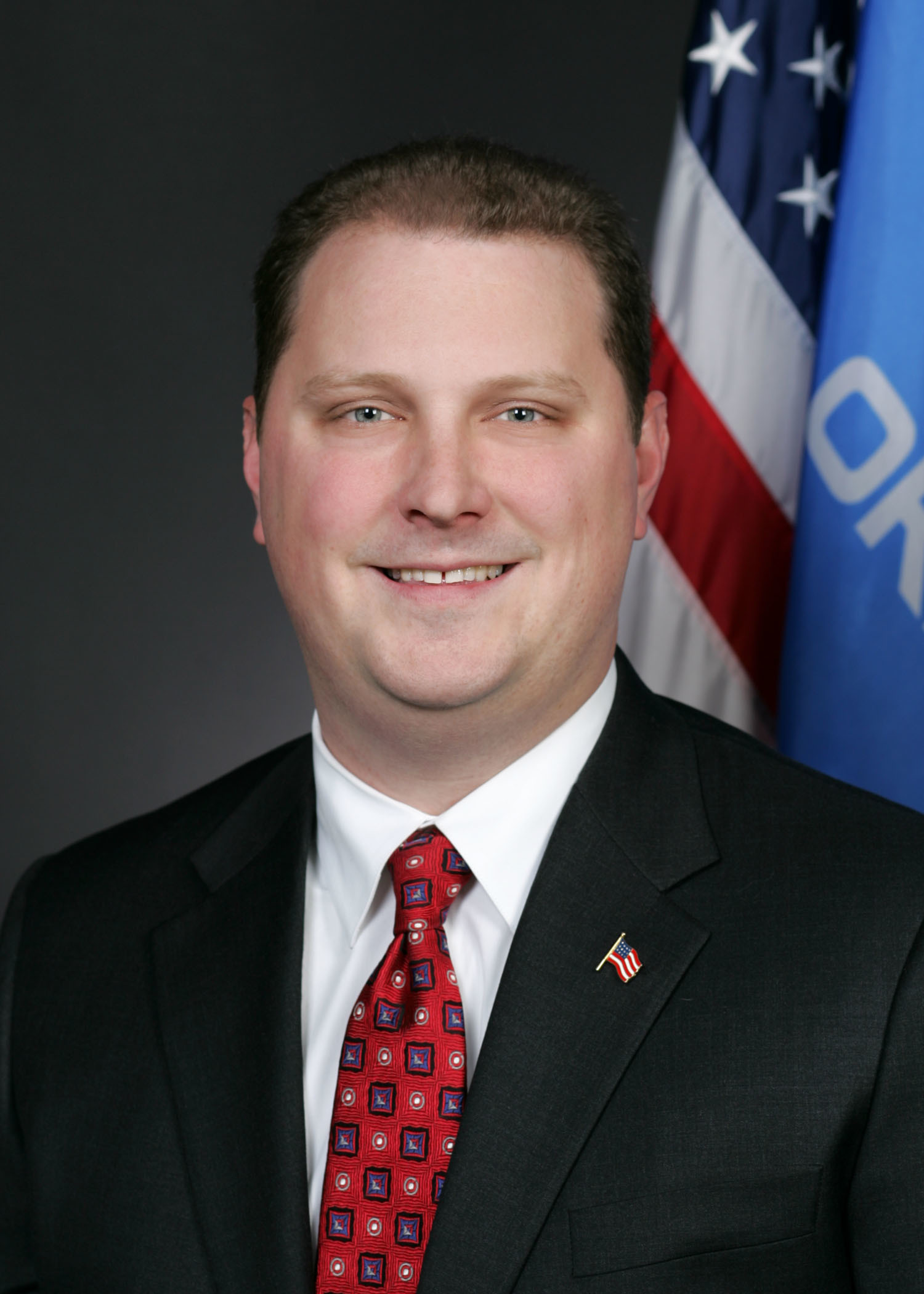News Articles
Monday, March 13, 2017
Amended Bill Opts Out of Trying to Revive Opt Out
- State: Oklahoma
- Topic: Top
- - Popular with: Legal
- - 1 share
Lawmakers amended a bill that attempted to revive the Oklahoma Option with a committee substitute that makes no mention of the former Employee Injury Benefit Act, which was thrown out by the state Supreme Court.

Rep. Jon Echols
Amended House Bill 1462, sponsored by Rep. Jon Echols, R-Oklahoma City, passed the Judiciary-Civil and Environmental Committee by an 11-0 vote on Feb. 28.
It is available for a floor vote as soon as today, according to the floor agenda for the House of Representatives.
The amendment more than doubled the bill in size, from 95 pages to 206, and contains sweeping changes, some of which shore up court decisions and improve employee benefits.
For example, the amendment changes the definition of cumulative trauma to allow such claims regardless of how long an employee has worked on the job. The Supreme Court ruled that the current statute, which requires at least 180 days of continuous employment, was unconstitutional.
HB 1462 also would transfer the authority to hear retaliation claims from the Workers’ Compensation Commission to any district court and sets a $100,000 limit on punitive damages. It also strips the commission of the power to determine issues of constitutionality.
Insurers cautioned that there’s plenty of time left in the legislative session, and plenty of lawmakers and business interests that could still revive opt out.
“The current version of 1462 might make it appear there’s no future in opt out, but you have to consider the larger picture in Oklahoma: It’s a very fluid situation. It’s only March and they’ll go well into May,” said Fred Bosse, American Insurance Association vice president for the Southeast region.
“I don’t think proponents and some of the legislators in favor of opt out have given up on it. The chamber has certainly not given up on it. They’re hoping to resuscitate at least some of it,” Bosse said.
Roy Williams, president of the Greater Oklahoma City Chamber, backed out of a scheduled telephone interview on Friday. The chamber’s media relations coordinator, Carrie Snodgrass, emailed after the scheduled interview that “we don’t have any information on this bill.”
The State Chamber of Oklahoma on Friday applauded HB 1462, even though it eliminates any reference to opt out.
“For this session, I don’t think the alternative coverage will be revived,” said Jonathan Buxton, the chamber’s senior vice president of government affairs. “We’d still like to continue talks about it and improve it and make it a more manageable system. However, we’re seeing a substantial savings in the administrative system.”
In addition to adding the Oklahoma Option in 2013, the Legislature took workers’ compensation from a court-based system to an administrative system in a reform bill called the Administrative Workers’ Compensation Act. Buxton said that between 2013 and 2015, premiums dropped by $68 million, “so there’s isn’t the pressing need to talk about alternative coverage.”
Trey Gillespie, assistant vice president of workers’ compensation for the Property Casualty Insurers Association of America, said PCI is still reviewing the voluminous committee substitute but that “it’s definitely a very favorable bill” compared to the version introduced.
“It appears as though they’re not contemplating trying to revive opt out, but there’s still a long way to go in this session,” Gillespie said. “We have always opposed the various opt-out bills since 2012. We’ve yet to see a draft of an opt-out bill that would create a responsible alternative to workers’ compensation, and would protect injured workers and taxpayers.”
Oklahoma courts and the Workers' Compensation Commission have ruled unconstitutional about 40 provisions of the Employee Injury Benefit Act since its adoption in 2013. The option allowed employers to purchase their own benefit plans instead of providing coverage through the Administrative Workers’ Compensation Act.
Opt-out supporter Bill Minick, president of Dallas-based PartnerSource, which sells alternative benefit plans, said he was unavailable for most of last week to comment. He said the comp-related bills moving through the Oklahoma Legislature do not relate to opt out, anyway.
A.J. Donelson, a consultant with the Association for Responsible Alternatives to Workers’ Compensation, said he had not read the amended HB 1462 but added, “Obviously, we’re in favor of states taking a look at workers’ compensation alternatives” and that Oklahoma “had a great track record with their previous workers’ comp alternative.”
Amended HB 1462 calls for an 8% increase in maximum permanent partial disability benefits. PPD benefits would be determined if an injured worker reaches maximum medical improvement with a formula that calls for 70% of the employee’s average weekly wage, up to $350. The current limit is $323.
Another House bill, HB 1921, is substantially similar to HB 1462 but would allow a temporary surcharge of up to 10% of workers' compensation premiums to be assessed by the commission to cover future obligations of the Multiple Injury Trust Fund. It also increases annual appropriations to the commission’s Revolving Fund from $3 million to $5 million.
HB 1921 passed the Judiciary-Civil and Environmental Committee by a 9-1 vote on Feb. 28.
Insurers said they also are monitoring Senate Bill 737, which the Judiciary Committee recommended “do pass as amended” on Feb. 28.
SB 737 would require, for the purposes of making permanent disability ratings, physicians to use the sixth edition of the American Medical Association’s Guides to the Evaluation of Permanent Impairment, and not the most recent edition.
It also would subject noncompliant employers to a maximum $100,000 in damages if a worker can show by the preponderance of the evidence that the Worker’s Compensation Act was violated.
Other workers’ compensation bills introduced in Oklahoma include:
- HB 1572, which passed the Insurance Committee 11-0 on Feb. 28 and makes the Self-insurance Guaranty Fund Board, instead of the commission, the custodian of securities on deposit from a self-insurer.
- HB 2242, which passed the Judiciary-Civil and Environmental Committee by a 9-1 vote on Feb. 28, and relates to workers’ compensation coverage for subcontracted work performed by a nonemployee. It provides that when there is no coverage, the party for whom the work is being performed will be liable for compensation of the injured worker.
- SB 662, which would repeal the Oklahoma Option altogether. It has not been assigned to a committee since its Jan. 19 introduction. Stakeholders say the bill is unnecessary because the Oklahoma Option officially died in mid-January after a 90-day transition period following the state Supreme Court’s 7-2 ruling that it was unconstitutional.
Today’s News
- Minn. - Supreme Court Upholds Award to Social Worker for PTSD Top 04/19/24
- Ohio - Industrial Commission Properly Exercises Authority to Correct Error of Law NORTH 04/19/24
- N.C. - Employer Can't Be 3rd-Party Defendant in Suit Over Fatal Wall Collapse SOUTH 04/19/24
- N.Y. - Worker Shouldn't Have Been Denied Summary Judgment on Labor Law Claim NORTH 04/19/24
- Calif. - Committee Passes Bill to Revise Poster Requirements WEST 04/19/24
- Okla. - Legislature Approves Electronic Cancellation Measure SOUTH 04/19/24
- Texas - DWC Offers CLE for Attorneys Attending Insurer Quarterly Meeting SOUTH 04/19/24
Advertisements
Now Trending
- Workers' Compensation News
-
Calif.
Chiropractor Sentenced to More Than
54 Years, Fined…
Posted on Apr 16, 2024
-
Calif. Court
Upholds Summary Dismissal of
Worker's Claims for Retaliation,…
Posted on Apr 17, 2024
-
Calif. Contractor
Pleads Guilty to Underreporting…
Posted on Apr 15, 2024
-
Calif. WCIRB
Approves Recommendation for 0.9%
Rate…
Posted on Apr 18, 2024
-
Calif. Committee
Passes Bill to Revise Poster…
Posted on Apr 19, 2024
-
Ill. Worker Who
Repeatedly Failed to Appear at
Hearings Can't Get Claim…
Posted on Apr 15, 2024
-
Fla. State Joins
Texas in Prohibiting Local
Workplace Safety…
Posted on Apr 16, 2024Joe Paduda says: “All of us in the Worker’s Comp. industry should push to improve…”
-
Neb. Lawmakers
Send Schedule Rating Bill to…
Posted on Apr 15, 2024
-
N.Y. Court: Worker
Should Have Been Denied Leave to
File Late…
Posted on Apr 17, 2024
-
La. Court
Overturns PTD Award for Worker With…
Posted on Apr 17, 2024
Jobs
Upcoming Events
May 5-8, 2024
Risk World
Amplify Your Impact There’s no limit to what you can achieve when you join the global risk managem …
May 13-15, 2024
NCCI's Annual Insights Symposi
Join us May 13–15, 2024, for NCCI's Annual Insights Symposium (AIS) 2024, the industry’s premier e …
May 13-14, 2024
CSIA Announces the 2024 Annual
The Board of Managers is excited to announce that the CSIA 2024 Annual Meeting and Educational Con …
Social Media Links
c/o Business Insurance Holdings, Inc.
Greenwich, CT 06836






No Comments
Log in to post a comment